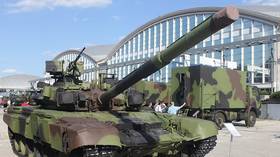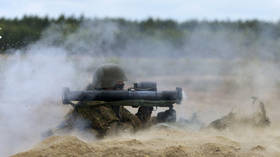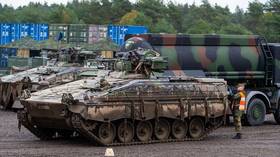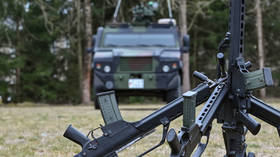Ukraine to get battle tanks as part of swap deal by EU nations

Kiev is to receive a shipment of battle tanks from Slovenia “in the coming days” as part of a swap deal agreed by Ljubljana and Berlin, German Defense Minister Christine Lambrecht confirmed on Thursday. Slovenia is reportedly to hand over dozens of its Soviet-made heavy equipment pieces to Ukraine in exchange for infantry fighting vehicles (IFVs) and armored personnel carriers (APCs) from Germany.
"It's about tanks, it's about armored personnel carriers, it's about different options that individual countries have to hand over,” Lambrecht told German broadcaster RTL. The minister did not specify the number of items of equipment each side has to hand over as part of the deal but said that Ukraine should receive the delivery “in the next few days.”
According to France’s AFP and Germany’s dpa news agencies, Slovenia is to deliver the Soviet-made T-72 main battle tanks to Kiev and receive Marder IFVs and Fuchs APCs from Berlin. The idea behind the deal is to supply Ukraine with usable equipment as soon as possible, Lambrecht has explained.
"The point is that things can now be done quickly, that weapons are delivered as quickly as possible," she said, adding that stocks of the Central and Eastern European nations dating back to the Soviet times are best suited for such schemes since military equipment provided by them “requires no training” on the part of Ukrainians, who are already familiar with that sort of equipment.
According to Euractiv, Ljubljana might deliver between 30 and 40 T-72 tanks to Ukraine as part of the deal. Slovenia has not commented on the arrangement so far. Ljubljana has only admitted that Defense Minister Matej Tonin had talked to Lambrecht via a video call on Wednesday.
“They discussed how allied countries can help Ukraine to defend itself against Russian aggression, and from this aspect, different ways in which Slovenia and Germany can jointly help Ukraine,” the Slovenian Defense Ministry has said.
According to some media reports, Slovenia does not have the Soviet-made T-72 tanks but instead possesses the Yugoslavian M-84 tanks, which are a modified version of the Soviet ones.
Western nations have been supplying Ukraine with arms almost since the start of the Russian military operation on its territory in late February. Most arms deliveries included small arms, anti-tank and anti-air missiles, as well as fuel and munitions. Kiev has repeatedly requested heavy weaponry, such as tanks or warplanes but Western nations have, to date, been largely hesitant to provide these. There have been reports about the Czech Republic sending tanks to Ukraine but Prague has never officially confirmed them.
Top Ukrainian officials, including the country’s president Volodymyr Zelensky and ambassador to Germany, Andrey Melnik, have been particularly critical of the German government for its failure to provide Kiev with heavy weaponry. According to the German media, Chancellor Olaf Scholz and his Social Democratic party have been skeptical about the idea of supplying Ukraine with heavy arms while their coalition partners – the Green Party and the Free Democrats – have been in favor of more robust support.
Earlier this week, German Foreign Minister Annalena Baerbock revealed that Germany has supplied more weapons and military equipment to Ukraine than previously confirmed, citing the need to deliver them as quickly as possible. The supplies included anti-tank missiles and air-defense Stinger missiles, according to the minister.
Berlin also reportedly plans to spend an additional €2 billion ($2.16 billion) on military needs, most of which is aimed at providing supplies to Ukraine, according to Reuters. At the same time, Germany’s parliamentary commissioner for the Armed Forces, Eva Hoegl, has warned that Berlin cannot just send Ukraine anything it has in its stocks and admitted that the German army itself is still undersupplied when it comes both to heavy equipment and personal weapons.
Russia attacked its neighboring state in late February, following Ukraine’s failure to implement the terms of the Minsk agreements, first signed in 2014, and Moscow’s eventual recognition of the Donbass republics of Donetsk and Lugansk. The German- and French-brokered protocols were designed to give the breakaway regions special status within the Ukrainian state.
The Kremlin has since demanded that Ukraine officially declare itself a neutral country that will never join the US-led NATO military bloc. Kiev insists the Russian offensive was completely unprovoked and has denied claims it was planning to retake the two republics by force.















